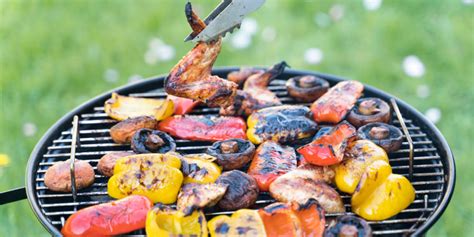
Certain foods, while tempting to toss on the grill, can lead to hazardous outcomes, damage your equipment, or simply result in a less-than-desirable culinary experience; experts advise caution when considering grilling items like bone-in chicken, certain vegetables, delicate fish, pizza, bread, tofu, bacon, cheese, yogurt, and whole avocados.
The allure of grilling food outdoors is undeniable, but not all foods are created equal when it comes to withstanding the heat and flames. According to culinary experts, some ingredients are best kept away from the grill for various reasons, ranging from safety concerns to potential damage to your grilling equipment and, ultimately, achieving a poor taste. Understanding these limitations can save grill enthusiasts from potential disasters and ensure a more enjoyable and delicious grilling experience.
Foods to Avoid Grilling:
-
Bone-in Chicken: While grilled chicken is a backyard barbecue staple, bone-in pieces, especially larger cuts, pose a significant challenge. “Bone-in chicken takes much longer to cook, and the outside will char long before the inside is cooked,” cautions culinary professionals. This uneven cooking can lead to undercooked chicken near the bone, which carries a high risk of salmonella contamination. To mitigate this, chicken should be cooked to an internal temperature of 165°F (74°C), using a meat thermometer to ensure accuracy. Boneless, skinless chicken breasts or thighs are generally a safer and quicker alternative for grilling.
-
Certain Vegetables: While many vegetables benefit from the smoky char of the grill, some are simply too delicate and can easily fall through the grates or become overly charred before they are cooked through. Small or thinly sliced vegetables like asparagus spears, bell pepper slivers, or green beans are prime examples. These vegetables tend to dry out and burn quickly, offering little in terms of flavor or texture. If you still want to grill these vegetables, consider using a grill basket or foil packet to protect them from direct flames and prevent them from falling through the grates. Heartier vegetables like corn on the cob (with the husk on), bell pepper halves, thick slices of eggplant, and zucchini are better suited for grilling.
-
Delicate Fish: Grilling delicate fish such as tilapia, cod, or sole can be a frustrating experience. The flesh of these fish is prone to sticking to the grates and falling apart, leaving you with a mangled mess. According to food experts, “Delicate fish… easily flakes apart when grilled.” To grill fish successfully, opt for firmer varieties like salmon, tuna, or swordfish. These fish have a higher fat content, which helps to keep them moist and prevents them from sticking. Ensure the grill grates are clean and well-oiled before placing the fish on the grill. Using a fish basket or grilling plank can also help to prevent sticking and maintain the fish’s integrity.
-
Pizza: While some adventurous grillers may attempt to grill pizza, it’s generally not recommended for beginners. Grilling pizza requires precise temperature control and timing, and it can easily result in a burnt crust or undercooked toppings. “Grilled pizza is tricky to master because it requires a very hot grill and a quick cooking time,” experts state. The high heat can quickly char the crust before the cheese has melted or the toppings are heated through. For a more consistent and predictable result, baking pizza in a conventional oven is typically the better choice. If you’re set on grilling pizza, consider using a pizza stone on the grill to distribute the heat more evenly and prevent burning.
-
Bread: Similar to pizza, bread can be challenging to grill without burning. The high heat of the grill can quickly dry out the bread and create an unpleasant, charred exterior. While some people enjoy the taste of lightly toasted bread, it’s easy to overdo it on the grill. “Bread can burn very easily on the grill if you are not paying attention,” professionals warn. If you want to grill bread, consider brushing it lightly with olive oil and grilling it briefly over medium heat, flipping it frequently to prevent burning. Thick slices of crusty bread are better suited for grilling than thin slices of soft bread.
-
Tofu: Tofu, in its natural state, has a high moisture content, making it prone to sticking to the grill and falling apart. The soft texture of tofu can also make it difficult to handle on the grill. Experts explain, “Tofu is very delicate and can easily fall apart on the grill.” To successfully grill tofu, it’s essential to press out as much excess water as possible before grilling. This can be done by wrapping the tofu in paper towels and placing a heavy object on top for at least 30 minutes. Marinating the tofu before grilling can also help to add flavor and prevent it from drying out. Firm or extra-firm tofu varieties are better suited for grilling than softer varieties.
-
Bacon: Grilling bacon may seem like a good idea, but the high fat content of bacon can lead to flare-ups and a greasy mess. As the fat renders, it drips onto the coals or burners, creating flames that can quickly burn the bacon. “The grease from bacon can cause flare-ups on the grill, which can burn the bacon and create a smoky mess,” food critiques noted. Grilling bacon can also be difficult to control, as the bacon tends to curl up and stick to the grates. For a less messy and more controlled cooking method, pan-frying bacon on the stovetop or baking it in the oven is generally preferred.
-
Cheese: Unless you’re intentionally melting cheese on burgers or other dishes, grilling cheese directly on the grates is a recipe for disaster. The cheese will melt quickly and drip through the grates, creating a sticky mess and potentially damaging your grill. “Cheese will melt and drip through the grates, creating a mess and a potential fire hazard,” culinary experts advised. While some cheeses, like halloumi, are designed to be grilled, most cheeses are best kept away from direct heat.
-
Yogurt: While grilling yogurt might not be the first thing that comes to mind, some adventurous cooks have experimented with grilling yogurt-based sauces or marinades. However, the high water content of yogurt means that it will quickly evaporate on the grill, leaving behind a dry and potentially curdled residue. “Yogurt will quickly evaporate and curdle on the grill, leaving a dry and unpleasant texture,” critics state. Yogurt is best used as a cold topping or ingredient after the grilling process is complete.
-
Whole Avocados: While grilled avocados have become a popular trend, grilling them whole is not recommended. The pit inside the avocado prevents the heat from penetrating evenly, resulting in an unevenly cooked avocado. Additionally, the skin of the avocado can become charred and bitter, affecting the overall taste. “Grilling a whole avocado can result in uneven cooking and a bitter taste from the charred skin,” according to culinary experts. If you want to grill avocados, cut them in half, remove the pit, and brush the cut sides with oil before grilling.
Expert Tips for Successful Grilling:
Even with the foods listed above, there are ways to mitigate the risks and achieve grilling success. Here are some expert tips to keep in mind:
- Use a Meat Thermometer: Ensure that meat, especially poultry, reaches a safe internal temperature to prevent foodborne illness.
- Marinate: Marinating can add flavor and moisture to foods, helping to prevent them from drying out on the grill.
- Oil the Grates: Oiling the grates before grilling helps to prevent food from sticking and makes cleanup easier.
- Use a Grill Basket or Foil Packet: For delicate vegetables or small pieces of food, a grill basket or foil packet can prevent them from falling through the grates and burning.
- Control the Heat: Adjust the heat of your grill to suit the food you are cooking. High heat is ideal for searing, while lower heat is better for slow cooking.
- Clean the Grill Regularly: A clean grill is a safe grill. Remove any food debris and grease buildup to prevent flare-ups and ensure even cooking.
Expanding on the Dangers and Alternatives:
Beyond the simple warnings, it’s important to understand the “why” behind these grilling no-nos and to explore safer alternatives.
-
Bone-in Chicken: The Salmonella Risk in Detail: Salmonella is a bacteria that can cause food poisoning, leading to symptoms like diarrhea, fever, and abdominal cramps. Chicken is a common carrier of salmonella, and when it’s not cooked to a safe internal temperature, the bacteria can survive and make you sick. Bone-in chicken is particularly problematic because the bone acts as an insulator, slowing down the cooking process near the bone. This means that the outside of the chicken may be fully cooked, while the meat near the bone is still undercooked and potentially harboring salmonella. A safer alternative is to opt for boneless, skinless chicken breasts or thighs, which cook more evenly and quickly. If you prefer bone-in chicken, consider pre-cooking it in the oven before finishing it on the grill to ensure it’s cooked through.
-
Delicate Vegetables: Preventing the Fall-Through: Small or thinly sliced vegetables are prone to falling through the grill grates, which can be frustrating and wasteful. They also tend to dry out and burn quickly due to their small size and high surface area. A grill basket or foil packet provides a barrier between the vegetables and the flames, preventing them from falling through and allowing them to cook more evenly. You can also skewer the vegetables to keep them together. For example, cherry tomatoes, mushrooms, and zucchini chunks can be threaded onto skewers for easy grilling.
-
Delicate Fish: The Sticking Point: Delicate fish have a tendency to stick to the grill grates, which can make them difficult to flip and result in them falling apart. This is due to their delicate flesh and low fat content. Firm fish, like salmon, tuna, and swordfish, have a higher fat content, which helps to keep them moist and prevents them from sticking. Before grilling any type of fish, ensure the grill grates are clean and well-oiled. You can also use a fish basket or grilling plank to prevent sticking and maintain the fish’s integrity. Cedar planks are a popular choice for grilling fish, as they impart a subtle smoky flavor.
-
Pizza and Bread: Mastering the Heat: Grilling pizza and bread requires precise temperature control and timing to prevent burning. The high heat of the grill can quickly char the crust or bread before it’s cooked through. Using a pizza stone on the grill can help to distribute the heat more evenly and prevent burning. You can also pre-cook the crust or bread slightly before grilling to reduce the cooking time on the grill. When grilling pizza, be sure to keep a close eye on it and rotate it frequently to prevent burning.
-
Tofu: The Pressing Matter: Tofu has a high moisture content, which makes it prone to sticking to the grill and falling apart. Pressing out the excess water before grilling is essential for achieving a firm and grillable texture. To press tofu, wrap it in paper towels and place a heavy object on top for at least 30 minutes. You can also use a tofu press, which is a specialized device designed to remove excess water from tofu. Marinating the tofu before grilling can also help to add flavor and prevent it from drying out. Use a marinade that is high in oil and soy sauce, which will help to create a crispy exterior.
-
Bacon: The Grease Fire Hazard: The high fat content of bacon can lead to flare-ups and a greasy mess on the grill. As the fat renders, it drips onto the coals or burners, creating flames that can quickly burn the bacon. Pan-frying bacon on the stovetop or baking it in the oven are safer and more controlled cooking methods. If you want to grill bacon, consider using a grill pan with a perforated bottom to allow the grease to drain away from the bacon.
-
Cheese: The Meltdown: Cheese will melt quickly and drip through the grates, creating a sticky mess and potentially damaging your grill. While some cheeses, like halloumi, are designed to be grilled, most cheeses are best kept away from direct heat. Halloumi is a semi-hard, brined cheese that has a high melting point, making it suitable for grilling. You can also grill cheese in a foil packet with other ingredients, such as vegetables and herbs.
-
Yogurt: The Curdling Effect: Yogurt will quickly evaporate and curdle on the grill, leaving a dry and unpleasant texture. Yogurt is best used as a cold topping or ingredient after the grilling process is complete. You can use yogurt as a marinade for meat or vegetables before grilling, but be sure to remove the excess yogurt before placing the food on the grill.
-
Whole Avocados: Uneven Cooking and Bitter Taste: Grilling a whole avocado can result in uneven cooking and a bitter taste from the charred skin. Cutting the avocado in half, removing the pit, and brushing the cut sides with oil before grilling allows the heat to penetrate evenly and prevents the skin from becoming overly charred. You can also grill avocado slices, which are easier to handle and cook more quickly.
Beyond the List: Expanding Your Grilling Horizons Safely
While these ten foods present specific challenges, remember that grilling is an art form that can be mastered with practice and knowledge. Always prioritize safety and be mindful of the potential risks associated with different foods and cooking methods. Experiment with different techniques, marinades, and grilling accessories to expand your grilling horizons while staying safe and creating delicious meals.
The Importance of Grill Maintenance
The lifespan and efficiency of a grill largely depends on consistent and proper maintenance. Before and after each grilling session, cleaning the grates is paramount. Food debris and grease buildup not only affect the flavor of your food but also pose a significant fire hazard. A stiff wire brush is typically used for this purpose, ensuring all residue is removed. For gas grills, it’s crucial to periodically inspect the burners for any blockages or damage, ensuring even heat distribution. Charcoal grills require ash removal after each use to maintain proper airflow. Beyond regular cleaning, covering your grill when not in use protects it from the elements, preventing rust and prolonging its usability. Yearly deep cleaning, which includes disassembling and thoroughly scrubbing the grill’s components, is recommended to maintain optimal performance and safety. Neglecting these maintenance practices can lead to diminished grilling quality, increased safety risks, and a shortened lifespan for your grill.
Safety First: Preventing Grilling Accidents
Grilling, while enjoyable, carries inherent risks that must be addressed to prevent accidents. Firstly, always grill outdoors in a well-ventilated area to avoid carbon monoxide poisoning. Keep the grill away from flammable materials such as wooden decks, fences, and overhanging branches. It’s essential to have a fire extinguisher or a bucket of sand and water nearby in case of flare-ups or accidental fires. When using gas grills, inspect the propane tank and hoses for leaks before each use, and never store spare propane tanks indoors. For charcoal grills, use only approved charcoal starter fluids and never add more fluid to hot coals. Children and pets should be kept at a safe distance from the grilling area to prevent burns and other injuries. Wear appropriate grilling attire, including oven mitts or heat-resistant gloves, to protect your hands from the heat. Finally, never leave a grill unattended while it’s in use, and ensure it’s completely cooled down before storing or covering it. By adhering to these safety guidelines, you can minimize the risks and enjoy a safer grilling experience.
FAQ (Frequently Asked Questions)
1. Why is bone-in chicken considered risky to grill?
Bone-in chicken takes longer to cook, and the outside tends to char before the inside is fully cooked. This increases the risk of undercooked meat near the bone, which can harbor harmful bacteria like salmonella. As experts say, “Bone-in chicken takes much longer to cook, and the outside will char long before the inside is cooked.” To avoid this, use a meat thermometer to ensure the internal temperature reaches 165°F (74°C) or opt for boneless, skinless pieces.
2. What’s the best way to grill delicate vegetables without them falling through the grates?
Small or thinly sliced vegetables like asparagus and green beans can easily fall through the grill grates. The best solution is to use a grill basket or foil packet. These methods protect the vegetables from direct flames, prevent them from falling through, and allow for more even cooking. Alternatively, you can skewer the vegetables to keep them together.
3. How can I prevent delicate fish from sticking to the grill?
Delicate fish, like tilapia or cod, tends to stick and fall apart easily. Opt for firmer fish like salmon, tuna, or swordfish, which have a higher fat content that helps prevent sticking. Ensure the grill grates are clean and well-oiled before placing the fish on the grill. Using a fish basket or grilling plank can also help maintain the fish’s integrity.
4. Why is it not recommended to grill cheese directly on the grates?
Cheese melts quickly and drips through the grates, creating a sticky mess and a potential fire hazard. “Cheese will melt and drip through the grates, creating a mess and a potential fire hazard,” culinary experts warn. Unless you are using a cheese specifically designed for grilling, like halloumi, it’s best to avoid placing cheese directly on the grill.
5. What’s the issue with grilling a whole avocado?
Grilling a whole avocado can result in uneven cooking because the pit prevents heat from penetrating evenly. Additionally, the skin can become charred and bitter, affecting the overall taste. It’s better to cut the avocado in half, remove the pit, and brush the cut sides with oil before grilling to ensure even cooking and prevent bitterness. Experts agree, “Grilling a whole avocado can result in uneven cooking and a bitter taste from the charred skin.”
Conclusion: Informed Grilling for Culinary Success
Grilling is a versatile and enjoyable cooking method, but understanding its limitations is crucial for safety and culinary success. By avoiding grilling certain foods like bone-in chicken, delicate vegetables, delicate fish, pizza, bread, tofu, bacon, cheese, yogurt, and whole avocados, you can prevent potential hazards, protect your equipment, and achieve better-tasting results. Remember to use a meat thermometer, marinate foods, oil the grates, and control the heat to ensure safe and delicious grilling every time. Following expert tips and guidelines ensures that your grilling experiences are both enjoyable and safe. Always prioritize safety and cleanliness to maintain your grill and prevent accidents. Armed with the knowledge of what not to grill, you can confidently expand your grilling repertoire and enjoy the many benefits of outdoor cooking.









